A huge peaceful protest in Hong Kong against controversial plans to allow extraditions to the Chinese mainland descended into violence as police clashed with small pockets of demonstrators outside the city's parliament.
The violence began shortly after midnight local time, as police moved to clear protesters who had vowed to stay overnight outside parliament.
Demonstrators hurled bottles and used metal barricades as police moved in moments after the protest permit expired.
Officers used pepper spray hoses to push the crowds back, who shouted "We have a right to protest!"
The demonstrators grabbed what they could to create barricades and block roads near the legislature.
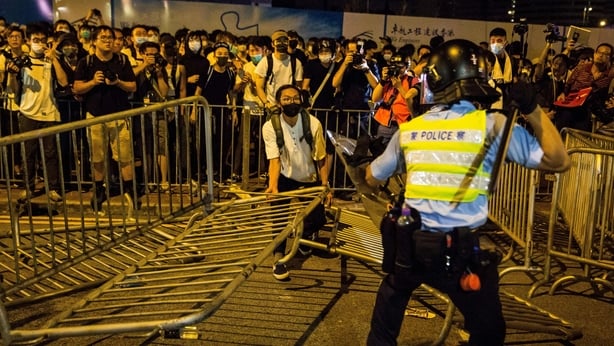
Just hours earlier protesters had been celebrating the huge turnout, hoping it would prompt the government into rethinking the law.
After seven hours of marching, organisers estimated 1,030,000 people took part.
That far outstrips a demonstration in 2003 when half that number hit the streets to successfully challenge government plans for tighter national security laws.
A police spokesman said police estimated 240,000 were on the march "at its peak".
The protests are already raising the pressure on the administration of Hong Kong Chief Executive Carrie Lam and her official backers in Beijing.
"She has to withdraw the bill and resign," veteran Democratic Party member James To told crowds gathering outside the city's parliament and government headquarters in the Admiralty business district.
"The whole of Hong Kong is against her," he said.
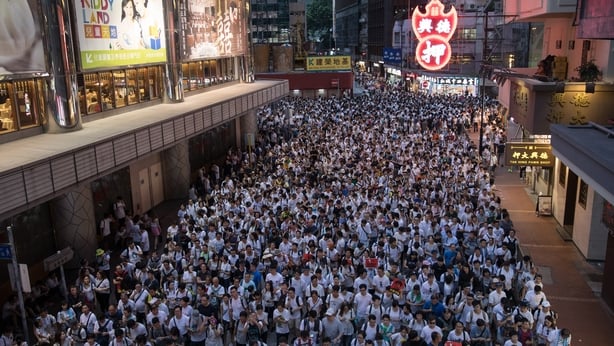
After Mr To spoke, thousands were still arriving, having started the march five hours earlier, filling four lanes of a major street.
Some sat in a nearby park singing "hallelujah", but on a nearby road tension was building after hours of peaceful protest.
Riot police armed with batons and helmets were gathering while government-funded broadcaster RTHK reported that they used pepper spray on six masked men trying to block the road.
Ms Lam has yet to comment on the rally and the future of the bill, which is due to be debated in the Legislative Council on Wednesday and could be passed into law by the end of June.
She has tweaked the amendments, but refused to pull the bill, saying it is vital to plug a long-standing "loophole".
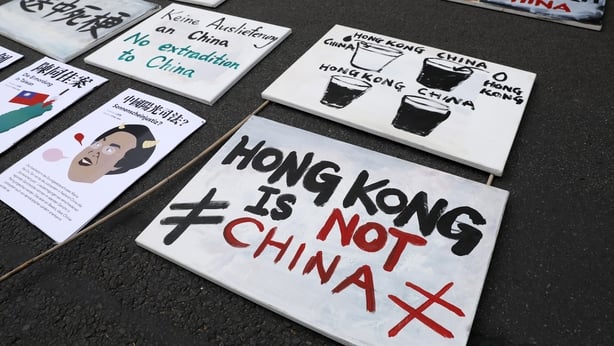
Time lapse video shared online on how hundreds of thousands marched to protest against an extradition bill #extraditionbill in Hong Kong pic.twitter.com/hOps5KF5VC
— Stella Lee (@StellaLeeHKnews) June 9, 2019
The demonstration capped weeks of growing outrage in the business, diplomatic and legal communities, which fear corrosion of Hong Kong's legal autonomy and the difficulty of ensuring basic judicial protections in mainland China.
US and European officials have issued formal warnings - concern matched by international business and human rights lobbies that fear the changes would dent Hong Kong's rule of law.
The former British colony was handed back to Chinese rule in 1997 amid guarantees of autonomy and various freedoms, including a separate legal system, which many diplomats and business leaders believe is the city's strongest remaining asset.
The unusually broad opposition to the rendition bill displayed today came amid a series of government moves to deepen links between southern mainland China and Hong Kong.
Chants of "no China extradition, no evil law" echoed through the high rise city streets as marchers snaked through the Causeway Bay and Wanchai shopping districts, while marchers called for Ms Lam and other senior officials to step down.
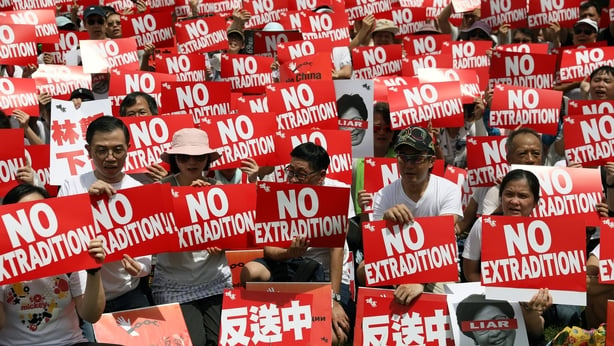
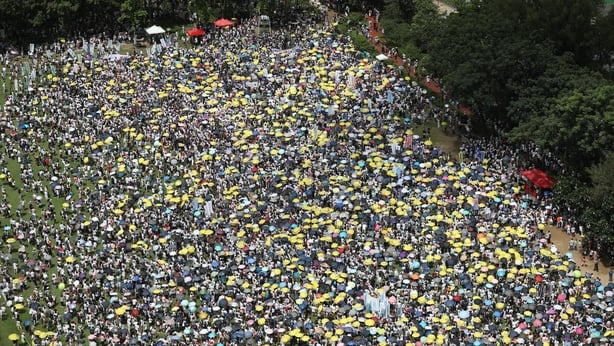
Some carried yellow umbrellas - a symbol of the pro-democracy Occupy protests that choked key city streets for 79 days in 2014.
One protester held a sign reading "Carry off Carrie", while another declared "Extradite yourself, Carrie". Another sign said "let's make Hong Kong great again", with a photo depicting US President Donald Trump firing Ms Lam.
The crowd included young families pushing babies in prams, as well as the elderly braving 32°C heat, some spraying each other with water misters.
Opposition to the bill has united a broad range of the community, from usually pro-establishment business people and lawyers to students, pro-democracy figures and religious groups.
Insurance agents, executives and small entrepreneurs joined bus drivers and mechanics in the streets. Dozens of people told Reuters it was their first protest march, with some remarking on the strong sense of unity among the diverse crowds.
"I come here to fight," said a 78-year-old man surnamed Lai, who was among the first to arrive.
Schoolteacher Garry Chiu joined the protest with his wife and one-year-old daughter, saying, "It is no longer about me."
"I need to save my daughter. If the law is implemented anyone can disappear from Hong Kong. No one will get justice in China. We know there are no human rights," Mr Chiu added.
"The extradition bill will directly threaten the core values of Hong Kong and rule of law," said 21-year-old Kelvin Tam, a student in London. "It will remove the firewall of Hong Kong judicial independence."
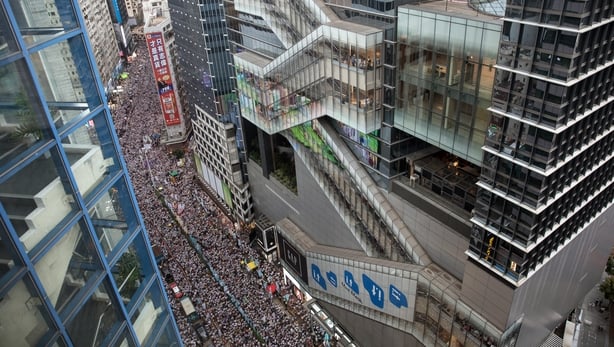
Protests against the bill were also planned today in 26 cities globally, including London, Sydney, New York and Chicago.
The amendments would simplify case-by-case arrangements to allow extradition of wanted suspects to jurisdictions, including mainland China, Macau and Taiwan, beyond the 20 with which Hong Kong already has extradition treaties.
Opponents of the bill question the fairness and transparency of the Chinese court system and worry about Chinese security forces contriving charges.
Chris Patten, the last British governor of Hong Kong, said on Thursday the bill would "strike a terrible blow ... against the rule of law, against Hong Kong's stability and security, against Hong Kong's position as a great international trading hub".

